- Home
- Andrew Wareham
06 A Soldier’s Farewell (Man of Conflict #6)
06 A Soldier’s Farewell (Man of Conflict #6) Read online
Man of Conflict Series
Book Six
Digital edition published in 2017 by
The Electronic Book Company
A New York Times Best-seller
Listed Publisher
www.theelectronicbookcompany.com
www.facebook.com/quality.ebooks
This ebook is licensed for your personal enjoyment only. This ebook may not be re-sold or given away to other people. If you would like to share this ebook with another person, please purchase an additional copy for each recipient. If you’re reading this ebook and did not purchase it, or it was not purchased for your use only, then please purchase your own copy. Thank you for respecting the hard work of this author. This ebook contains detailed research material, combined with the author's own subjective opinions, which are open to debate. Any offence caused to persons either living or dead is purely unintentional. Factual references may include or present the author's own interpretation, based on research and study. The cover image is adapted from an original photograph by Loozrboy @ flickr.
A Soldier’s Farewell
Copyright © 2017 by Andrew Wareham
All Rights Reserved
Contents:
Title Page
Copyright Page
Introduction
Chapter One
Chapter Two
Chapter Three
Chapter Four
Chapter Five
Chapter Six
Chapter Seven
Chapter Eight
Chapter Nine
Chapter Ten
Chapter Eleven
By the Same Author
Introduction
A Soldier’s Farewell: Septimus is sent to Canada in response to murderous raids across the border by uncontrolled American irregulars who are using the War of 1812 as an excuse for banditry. With the prospect of Bonaparte returning to France, he is called back and sent to the Low Countries to command Dutch-Belgic forces whose mission is to secure the coastal routes should the French seek to reconquer their lost territories.
Books best read in series order
Author’s Note: I have written and punctuated A Soldier’s Farewell in a style reflecting English usage in novels of the period, when typically, sentences were much longer than they are in modern English. Editor’s Note: Andrew’s book was written, produced and edited in the UK where some of the spellings and word usage vary slightly from U.S. English.
Man of Conflict Series
Book Six
Chapter One
“I have the command, Mr Presteigne.”
The captain of D company of the 69th Foot, senior of the two present, scowled and saluted to acknowledge Septimus’ order. Septimus spotted Presteigne’s senior sergeant out of the corner of his eye, saw a sigh of relief; the sergeant had seen battle and knew that Mr Presteigne had not, and doubted his capacity to learn quickly.
The two companies were formed side by side in a triple line across a dirt road, their flanks anchored on the thick forest, virgin softwoods, never worked and the ground beneath them so littered with fallen branches and dead timber as to be impassable to horse. To their front, distant perhaps a quarter of a mile, and the reason for their rapid deployment from column of route, was a mass of American cavalry, possibly a full regiment of their regular army, and showing sabres, as if they intended to charge.
“Four hundred, would you say, Captain Kidlington?”
“Thereabouts, sir, just possibly a few more. Eight troops, I would say, sir. Light cavalry. Within reason together, sir. Forming up now.”
“Good. It’s time we had some amusement.”
The war in Nova Scotia so far had been one of irregulars raiding and cutting up farmsteads and hamlets and then running before the militia and yeomanry and redcoats could arrive. They had gained almost no military advantage, and the British had taken no significant losses, but several hundreds of Nova Scotian farmers and their families had died, sometimes very badly, and their animals had been run off or slaughtered, their crops burned.
Septimus’ only regular battalion had sent out patrols of two companies at a time, marching for a week through the frontier areas in the hope of coming across raiders, and he had joined them on occasion, more to get a feel for the country than in hope of bringing the Americans to action. Now, he thought, he had been ambushed in his turn; his presence had been reported and the irregulars had drawn him out and into the hands of the American Army; he hoped so.
“Mr Presteigne! Front rank will fire to my command and will then kneel, presenting bayonets. Second and third ranks will reload without further order from me.”
The redcoats were marching loaded, two companies at close to full strength, having taken almost no losses in the winter months they had been in barracks. One hundred and sixty men, four sergeants, two ensigns, three lieutenants and two captains, all fairly healthy, and utterly green when it came to the field of battle.
The 69th had not been to war in the memory of any of the junior officers, and at least a third of its men had volunteered from the Militia or had been forcibly persuaded to join by their local magistrates in the previous two years. Of the old soldiers, Septimus doubted that one in ten had smelt powder. It was wiser, he thought, to take direct command on this occasion. The officers could discover what to do and the men could learn the sole important lesson – the regiment was never defeated; they would always win. While they believed they were immortal and invulnerable they might occasionally die but they would never lose, except sometimes, of course, when they were hopelessly outnumbered. The green hands might think this was one of those occasions – so they must learn the first lesson, that charging cavalry, irrespective of numbers, never had the advantage over steady men whose flanks were safe, either in square or holding an anchored line.
“Coming on now, sir,” Captain Kidlington commented in a conversational tone. Kidlington had never faced cavalry before, but he knew that his function as Septimus’ senior aide was to sit his saddle, apparently imperturbable, slightly bored even; he had in any case a degree of faith in Septimus, knew that he had not been in the habit of losing.
Septimus watched, getting a first impression of the American Army. Their uniforms were very plain, by European standards, dowdy in fact. He was used to the excesses of display of the French, had expected braid and feathers, which the Americans were very short of. The first troops had presented a very even line but had broken far too early into the gallop of the charge, an amateur’s mistake – it was inevitable that the stronger horses and wilder men would forge ahead, that the fastest would be ten yards and more ahead of the main body, leaving gaps.
“Front rank will take aim. Sergeants! Hold those barrels steady!”
There were men well out of the horizontal; they should have been controlled by their corporals – there would be recriminations and stripes at risk when this business was dealt with. The flogging triangle might well demonstrate that NCOs were appointed to do a job and could lose both stripes and skin off their backs if they showed idle.
“Cock your locks!”
Septimus waited until the first of the charging horsemen were at thirty yards.
“Fire!”
The first rank then made no attempt to reload but dropped to their knees and presented their muskets at about forty-five degrees, bayonets gleaming, butts firmly against their front foot. The riders might try to press forward but their horses would turn, would refuse to impale themselves; the sole fear was a dead horse sliding along the ground or a wounded animal running wild, maddened by its pain.
“Second rank, cock your locks. Fire!”
The second volley woul
d do the bulk of the killing; there were two troops entangled now, the first trying to control its horses and turn them back into the attack, the second hoping to pass through them. More than fifty musket balls into that mess should knock down a dozen horses and as many of men and provide a barrier that the third troop would find a hindrance; very few officers would trample the dead and the dying, horses or men, to take a straight line into the muskets.
The second rank fell immediately into the routine of reload and the third levelled its muskets in between them.
“Third rank, cock your locks.” No need for that command, they would have done so almost of a certainty, but best to keep to the orders they were used to. “Fire!”
Ten seconds gone since the second rank had started the reload; they should be given another ten. Septimus counted, watching them, seeing they were steady and well in hand. He took a glance down the road, could see almost nothing for the clouds of smoke.
“The disadvantage of trees, Captain Kidlington! They always block the powder smoke, prevent it dissipating – can’t see a damned thing after the first few seconds.” He raised his voice. “Second rank, fire!”
Another ten seconds counted off, ‘and one, and two…’ Slowly and calmly.
“Third rank, fire!”
Another fifty rounds sent off into the smoke – if there was a horseman left, he might be knocked down. The probability was that the ground was empty, but they could see nothing; there was no great additional outburst of screaming.
Captain Kidlington tried the old trick of standing on his saddle to get a better view; it always impressed those men who saw it but was to be attempted only by riders who were sober and possessed of a strong balance.
“They’re retiring, sir!”
“To be expected. Captain Presteigne, you will advance the men thirty paces.”
Septimus walked his horse forward, Kidlington at his side, Ensigns Rowlands and Longhurst immediately behind him. The first casualty was barely ten yards from the line, a young officer, dead under his horse; probably he had been leading his men to glory, had found only the grave.
Septimus looked at the men in front, saw them to step round the body, none of them to stop, and shook his head, called the nearest sergeant to him.
“I never thought to have to say this, sergeant! Disappointed in you, I am! Get your men to salvage every pair of good boots and then check every knapsack, saddle-bag and pocket for items of military importance.”
“Yes, sir. Beg pardon, sir, but I thought it was not wise with you watching, sir.”
“It is always wise to run a hand over a corpse, sergeant. Keep an eye out for bottles – don’t let them get hold of too many.”
“Sir!”
The men bent to looting, showing real enthusiasm rather than doubtful obedience to orders; a few screams arose as wounded men were turned over, but that was inevitable, a part of the game they had chosen to play. A few of the redcoats gave hoots of triumph, but most simply pocketed their gains in silence.
Septimus turned to his military family, grinning.
“Always give the men a reward. A coin or two, perhaps a watch; a bottle of rum; a pair of good boots – there is always one man in any platoon with a hole in the sole of his shoes. They might get hold of a pistol – always handy to have another unexpected shot in your belt. Turn the blind eye to such things – the men will know you are on their side, and they will quickly get on yours.”
A voice called from the middle of the butcher’s shambles where the second volley had broken the Americans.
“Sarge! This poor bastard’s ‘ad ‘is ‘ead kicked in, almost! His bloody eyes are all ‘anging out!”
“Finish the poor sod, and hope some bugger will do you the same favour one day! Shoot his bloody horse as well!”
They reached the edge of the powder smoke, saw the remainder of the cavalry debating what to do next.
“Reform the lines, Mr Presteigne. Command is yours.”
The young captain had seen what to do; now he could ready himself to put his lesson into effect.
“Two possibilities here, Kidlington. They might charge again – unlikely, because they know what will happen. The probability is that they will retreat, a long distance as well, for once they turn their backs to us they will find it hard to make their men fight again. The sole unknown in fact is whether they will seek a truce to pick up their wounded – that will tell us much of them.”
Kidlington could not understand why that might be.
“If their commanding officer cares so little for his men that he will abandon his wounded, well, he is not much of an opponent – he will not have a reliable regiment in future because they will have no more than contempt for him.”
“And what if he calls for truce, sir?”
“Then he will be granted two hours, in which his men will see that we are untouched and care nothing for them.”
“Will not that make them angry, sir?”
Septimus laughed.
“Of course, but also just a little less certain of themselves than they were yesterday. They will have learned that we do not see them as a worthwhile enemy – boys in the face of men. Given a situation where boldness will win the day, they may well choose caution, for having that slightly excessive respect for us. Battles are won inside men’s heads, Captain Kidlington. No, a correction to that, sir – this sort of small-scale skirmishing is won that way. I cannot speak of the greater battles, having very slight experience of them, but in the work we are likely to see this year, the mind of the soldier is very important.”
“White flag, sir!”
Ensign Rowlands had kept his attention on the enemy – the first he had ever seen on land.
Septimus glanced curiously at the youngster; he had wondered whether his wound, taken in their little encounter at sea off Halifax, might not have made him either shy or too valiant in search of revenge, but he seemed properly cool and casual. The boy had been two months confined to bed and had confounded his doctors by not only living but regaining his strength and activity; he was now one of the very few, the two or three in a hundred, who survived a wound to the abdomen and walked tall again.
“Thank’ee, Mr Rowlands. What do you see?”
“Officer, sir, major, I think – not entirely sure of the American badges, sir. Trumpeter at his side; man with a white flag to the fore. All on foot, sir.”
“Good. Go out to them. No, don’t dismount – we hold this field, so we show the arrogance of the victor – let them crane their necks up to you! Agree to a two-hour truce on your own initiative. If he wants more, return to confer with me.”
Captain Kidlington wondered whether he should not have been the man to conduct the parley, rather than a mere ensign… He laughed aloud as he realised the answer.
“That’s part of the game too, sir! Making a major stare up at an ensign, as if to imply that is all he is worth, all of the respect we have to offer to a very poor opponent.”
“Correct, Captain!”
“There is more to this business than ever I had realised, sir. Do you think that these raids were all along intended to bring us out so that the cavalry could cut us up?”
Septimus grinned, hoping that it might have been so.
“Probably. By attacking our civilians, they could force us out into the open and, in their minds, make us vulnerable. They have to weaken us, they think, before they can make a proper invasion aiming to take and hold territory. They have failed in Upper and Lower Canada, so their general may be trying here instead. I should respond, if I can, by discovering the location of their irregulars and mounting an assault upon their camps – but that may not be possible. This land is so damned big, Captain Kidlington! Men can stay undiscovered in these forests and hills for months at a time. I would need one hundred thousand of redcoats to ferret them all out – and even then, we would miss a few. We have this little victory solely because they came to us.”
“Thus, we require intelligence, sir.”
“Nor me, sir, in the nature of things. Would the Governor have a department, Intelligencers of his own, do you think? Or might there be a man or two from Whitehall, in residence, as you might say?”
“I do not know, Captain Kidlington. I have never had anything to do with such folk – I have never had occasion to do so. I am not certain, even, of who to ask.”
Ensign Rowlands walked his horse back to say that the American had asked for half a day, on the grounds that he would have to send back to his base for ambulance-carriages for his wounded.
“It seemed to me, sir, that if I agreed to that, then I would be permitting reinforcements to ready themselves to march out as soon as the time was up, that they might in fact bring themselves to a position not more than two or three miles away, ready to resume the fight. So I told him I must consult with you, sir, but that he could send his doctor and medical parties to begin their work now, sir.”
Septimus was pleased with the boy – he had thought and used his own initiative and come up with the best response.
“Very sensible, Mr Rowlands. I agree with your opinion. We have no wagons of any sort to hand, so cannot take the wounded into our care; they must remain in the hands of the Americans. But they certainly cannot have as much as half a day. Inform the gentleman that he may have two hours, or he may choose to set up camp here for his doctors, under my pledge to accept their parole and to permit them to return to his territory when their work is done. The wounded, those who survived, would be obliged to remain as prisoners of war in that event, of course.”
“Yes, sir. What if he sets up a camp for the doctors, sir?”
“Then he will have two hours to organise matters and must retire then. Any working party still making the camp may remain to serve as orderlies under parole and return to him with the doctors.”

 A Killing Too Far
A Killing Too Far Killing's Reward
Killing's Reward A New Place
A New Place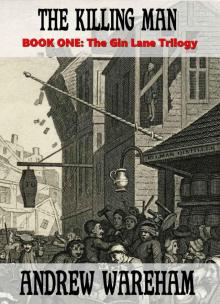 The Killing Man
The Killing Man Bold and Blooded
Bold and Blooded The Breaking Storm (Innocent No More Series, Book 2)
The Breaking Storm (Innocent No More Series, Book 2) Nobody’s Child
Nobody’s Child 04 Peking Nightmares (The Earl’s Other Son Series, #4)
04 Peking Nightmares (The Earl’s Other Son Series, #4) Red Man
Red Man Foreign Mud
Foreign Mud The Gathering Clouds (Innocent No More Series, Book 1)
The Gathering Clouds (Innocent No More Series, Book 1) 06 A Soldier’s Farewell (Man of Conflict #6)
06 A Soldier’s Farewell (Man of Conflict #6) Chinese Whispers
Chinese Whispers 02 Shanghai Dreams (The Earl’s Other Son #2)
02 Shanghai Dreams (The Earl’s Other Son #2) Hungry Harry: An Orphan in the Ranks
Hungry Harry: An Orphan in the Ranks A Wretched Victory (Innocents At War Series, Book 6)
A Wretched Victory (Innocents At War Series, Book 6) Illusions Of Change (A Poor Man at the Gate Series Book 6)
Illusions Of Change (A Poor Man at the Gate Series Book 6) The Wages Of Virtue (A Poor Man at the Gate Series, Book 8)
The Wages Of Virtue (A Poor Man at the Gate Series, Book 8) Blood and Famine (Man of Conflict Series, Book 4)
Blood and Famine (Man of Conflict Series, Book 4) The Friendly Sea (The Duty and Destiny Series, Book 1)
The Friendly Sea (The Duty and Destiny Series, Book 1)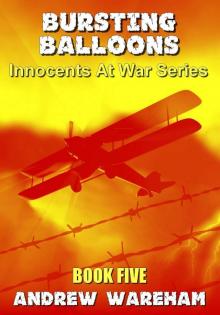 Bursting Balloons (Innocents At War Series, Book 5)
Bursting Balloons (Innocents At War Series, Book 5) The Death of Hope
The Death of Hope Deadly Shores (The Duty and Destiny Series, Book 11)
Deadly Shores (The Duty and Destiny Series, Book 11) The Vice Of Virtue (A Poor Man At The Gate Series Book 10)
The Vice Of Virtue (A Poor Man At The Gate Series Book 10) Virtue’s Reward (A Poor Man at the Gate Series, Book 11)
Virtue’s Reward (A Poor Man at the Gate Series, Book 11)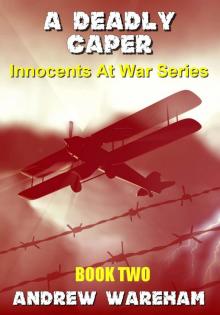 A Deadly Caper (Innocents At War Series, Book 2)
A Deadly Caper (Innocents At War Series, Book 2) The Pain Of Privilege (A Poor Man at the Gate Series Book 4)
The Pain Of Privilege (A Poor Man at the Gate Series Book 4) Far Foreign (The Duty and Destiny Series, Book 9)
Far Foreign (The Duty and Destiny Series, Book 9) Shores of Barbary (The Duty and Destiny Series, Book 12)
Shores of Barbary (The Duty and Destiny Series, Book 12) The Odd-Job Man (The Duty and Destiny Series, Book 7)
The Odd-Job Man (The Duty and Destiny Series, Book 7) Fire and Folly (Man of Conflict Series Book 3)
Fire and Folly (Man of Conflict Series Book 3) A Victorian Gent (The Making of a Man Series, Book 1)
A Victorian Gent (The Making of a Man Series, Book 1) Sugar and Spice (The Duty and Destiny Series, Book 6)
Sugar and Spice (The Duty and Destiny Series, Book 6)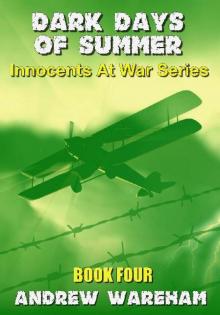 Dark Days Of Summer (Innocents At War Series, Book 4)
Dark Days Of Summer (Innocents At War Series, Book 4) Dire Shenanigans (The Making of a Man Series, Book 2)
Dire Shenanigans (The Making of a Man Series, Book 2) The Fuzzy-Wuzzy Man (The Duty and Destiny Series, Book 3)
The Fuzzy-Wuzzy Man (The Duty and Destiny Series, Book 3) Privilege Preserved (A Poor Man at the Gate Series Book 5)
Privilege Preserved (A Poor Man at the Gate Series Book 5)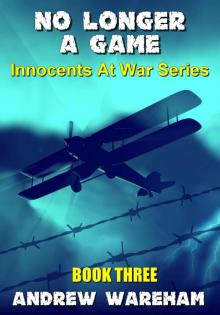 No Longer A Game (Innocents At War Series, Book 3)
No Longer A Game (Innocents At War Series, Book 3)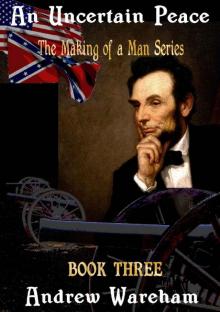 An Uncertain Peace (The Making of a Man Series, Book 3)
An Uncertain Peace (The Making of a Man Series, Book 3) Fortune And Glory (The Duty and Destiny Series, Book 5)
Fortune And Glory (The Duty and Destiny Series, Book 5) The Old Order (A Poor Man at the Gate Series Book 7)
The Old Order (A Poor Man at the Gate Series Book 7) A Place Called Home (Cannibal Country Trilogy, Book 2)
A Place Called Home (Cannibal Country Trilogy, Book 2) Nouveau Riche (A Poor Man at the Gate Series, Book 2)
Nouveau Riche (A Poor Man at the Gate Series, Book 2) The Privateersman (A Poor Man at the Gate Series Book 1)
The Privateersman (A Poor Man at the Gate Series Book 1) Britannia’s Son (The Duty and Destiny Series, Book 4)
Britannia’s Son (The Duty and Destiny Series, Book 4) Long Way Place (Cannibal Country Trilogy, Book 1)
Long Way Place (Cannibal Country Trilogy, Book 1) Spanish Tricks (Man of Conflict Series, Book 5)
Spanish Tricks (Man of Conflict Series, Book 5) A Parade Of Virtue (A Poor Man At The Gate Series Book 9)
A Parade Of Virtue (A Poor Man At The Gate Series Book 9) A Busy Season (The Duty and Destiny Series, Book 8)
A Busy Season (The Duty and Destiny Series, Book 8) Billy Bacon and the Soldier Slaves (Colonial Warrior Series, Book 1)
Billy Bacon and the Soldier Slaves (Colonial Warrior Series, Book 1) Raging Rajahs (Man of Conflict Series, Book 2)
Raging Rajahs (Man of Conflict Series, Book 2) Victorian Dawn (A Poor Man at the Gate Series, Book 12)
Victorian Dawn (A Poor Man at the Gate Series, Book 12) Born To Privilege (A Poor Man at the Gate Series Book 3)
Born To Privilege (A Poor Man at the Gate Series Book 3)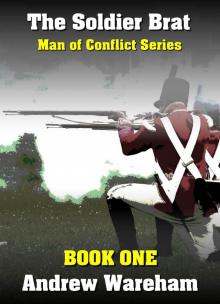 The Soldier Brat (Man of Conflict Series, Book 1)
The Soldier Brat (Man of Conflict Series, Book 1)